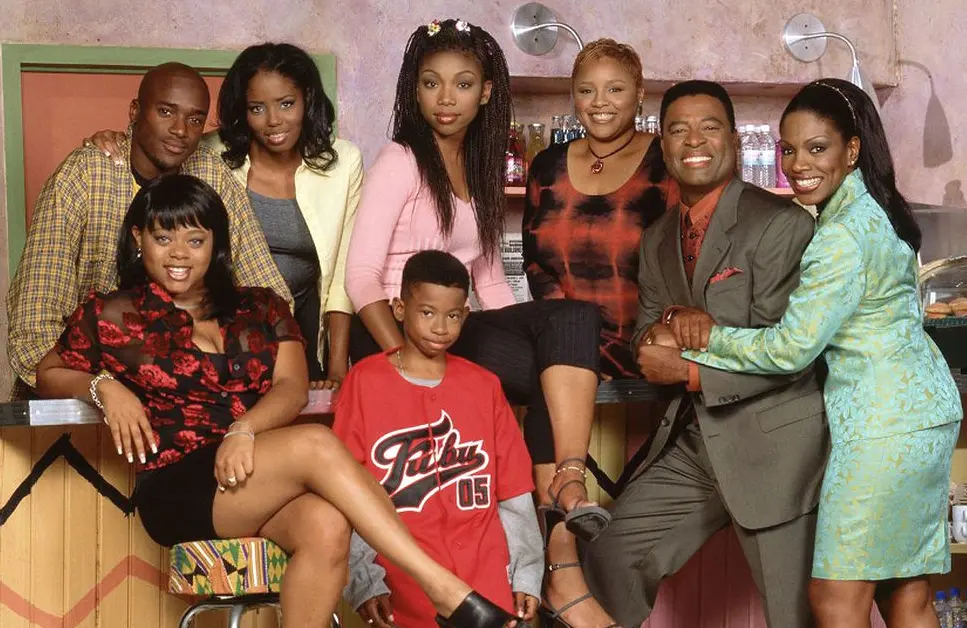Why Moesha on Netflix Means More Than You Might Think
-
 Moesha joined the Netflix lineup earlier this year.
Moesha joined the Netflix lineup earlier this year.There was cause for celebration this summer When Netflix anounced that it had licensed the streaming rights for a number of Black sitcoms from the '90s and early Aughts, including Moesha, The Game, Sister, Sister, Girlfriends, The Parkers, Half & Half, and One on One. Nostalgia was certainly a factor, but so was the troubling fact that despite a revolution in viewing habits, these shows and much of their brethren had not been made available on any of the major streaming platforms.
There have been exceptions. Living Single, a hit show when it aired on FOX in the mid-'90s, was picked up by in 2018 by Hulu, and the launch of HBO Max brought with it The Fresh Prince of Bel-Air. But when you consider that both of these shows are headlined by major stars — Queen Latifah in Living Single and Will Smith in The Fresh Prince — it's still startling how long it took for both to hit streaming. Meanwhile, a show like Martin, a bonafide hit series for FOX in the '90s, is currently only available on BET+, where episodes are heavily-edited sysndication cuts that are sequenced out of order with incorrect episode descriptions attached.
I'm far from the first to point out the disconnect between the "everything at your fingertips" nature of Peak TV and classic Black TV. In 2016, The Washington Post's Alyssa Rosenberg asked "Why are so many great black TV shows missing from streaming services?" The answer essentially boiled down to the fact that "streaming services have decided that black shows just aren't valuable to them." But that also meant Black audiences weren't spending their money on these streaming services because of the lack of access to these types of shows. If streaming services wanted to gain these audiences, Rosenberg concluded "they have a ready-made solution: Get the streaming rights to preexisting shows about black characters, or greenlight more shows like them."
To this day, Black classics like Sanford and Son, The Jeffersons, Good Times, and Diff'rent Strokes are streaming only with a Starz subscription. It's hard to know whether it's a lack of access or a lack of interest that's led to the ghettoization of these titles, but if the growing nostalgia culture and social media chatter around Moesha since its Netflix debut is any indication, it could well be the former. In a recent Washington Post article, Bentley Kyle Evans, showrunner for Martin and co-creator of The Jamie Foxx Show, lamented the situation, saying, "You don't even hear about shows like Malcolm & Eddie and Tracy Morgan's first show. It's as if they never existed," Yet, as Evans said. "There's a hunger for it."
Speaking personally — both as a TV/culture critic and as an older millennial — having these shows available on Netflix has been a real learning experience. I didn't actually watch Moesha when it originally aired, so while I don't have the full nostalgic experience in viewing it now, I do have at least enough Black and pop-cultural context to process the show both through a modern-day lens as well as the time period in which it aired. Knowing the trajectory of Brandy's career makes it easy to pick out particular callbacks, like the Cinderella homage or the brilliant I Know What You Did Last Summer riff that aired days before the awful I Still Know What You Did Last Summer premiered in theaters.
I've also been able to unpack own my biases and preconceptions about these Black sitcoms, having spent a disproportionate amount of my youth and then culture studies focused on their entrenched white counterparts. Moesha has been especially eye-opening when viewed in the context of respectability politics and the concept of the "exceptional Black person" trope that permeated '80s and '90s Black sitcoms, largely as a result of The Cosby Show. (I've got a lot of feelings about Moesha's father, Frank Mitchell, and none of them are positive. I can't imagine they would have been positive even if I had initially seen the character in my youth.) I've also been able to see how UPN attempted to leverage the show's popularity among Black audiences into a a seat at the table with white advertisers and white consumers, something that was fairly transparent in the show's Season 3 decision to transfer Moesha from Crenshaw High School to a predominantly white private school, only to give up on the plan once it failed to draw in new advertisers or demographics.
Like FOX and The WB before it, the UPN repeatedly attempted to transition to a more white-centric network, but it never actually succeeded in its time. Perhaps because while it was creating solid Black-led series like Moesha and most of the shows that Netflix is now blessedly streaming, it was also creating punchlines like the truly offensive The Secret Diary of Desmond Pfeiffer. But there's a reason the legacy truly lives on for the former, even with a lack of accessibility that is (very slowly) being rectified. It's about a lot more than just nostalgia.
Despite her mother's wishes, LaToya Ferguson is a writer living in Los Angeles. If you want to talk The WB's image campaigns circa 1999-2003, LaToya's your girl.
TOPICS: Moesha, BET, Netflix, UPN, The Fresh Prince of Bel-Air, The Parkers, African Americans and TV
- How UPN gave voice to a new generation of Black storytellers in the late 1990s and early 2000s before it was "merged out of existence"
- Netflix acquires classic Black comedies, including Moesha, Sister, Sister, and Girlfriends
- Recalling Kobe Bryant's TV cameos: From Sister, Sister to Moesha to Modern Family